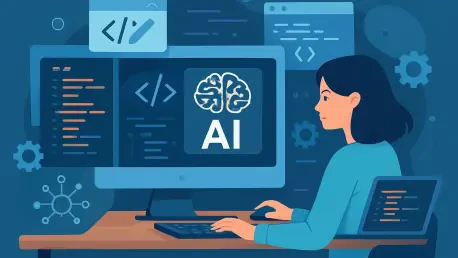In a world where technological advancements drive progress, AI tools promise to revolutionize code development in unprecedented ways. Global systems integrator R Systems International Limited is among the forerunners in this realm, integrating AI coding tools like Cursor, developed by Anysphere, into their operations. By training over 1,000 engineers to utilize Cursor, R Systems aims to forge new paths in application development and the modernization of legacy systems. Cursor’s differentiating strength is its ability to comprehend and integrate contextual environments essential for seamless code execution, a capability that sets it apart from other tools that often struggle with production integration. This strategic move reflects the broader trend of embedding AI into the software lifecycle to optimize processes and product quality.
R Systems’ Strategic AI Integration
Building a Co-Innovation Lab
R Systems’ commitment to advancing AI-driven software engineering practices is exemplified by the establishment of a Co-Innovation Lab. This initiative aims to cultivate a knowledge base and prompt repository to facilitate efficient AI utilization in software development. By incorporating a rigorous yet adaptable framework for software lifecycle management, the lab intends to enhance productivity across coding, testing, documentation, and DevOps workflows. Integrating AI tools like Cursor into these areas not only promotes innovation but also supports a vision for reducing error rates and speeding up delivery timelines. The Co-Innovation Lab is positioned to be a hub for pioneering practices where reusable, AI-driven approaches can be refined and scaled.
Incorporating Cursor into their proprietary platform, OptimaAI, R Systems seeks to achieve a significant boost in efficiency. This effort is geared towards a 30% increase in delivery velocity, a 25% reduction in defect density, and faster engineer onboarding times. By embedding Cursor within OptimaAI, R Systems aims not only to improve current practices but also to set new standards in how development cycles are managed. The synergy between strategic objectives and AI capabilities is expected to drive competitive advantages and propel R Systems as a leader in AI-assisted software engineering.
Enhancing Development Workflows
Further enriching the development process, R Systems is leveraging Cursor’s capabilities to simplify complex coding tasks. Derived from the versatile VS Code project, Cursor operates on robust language models such as Claude from Anthropic and OpenAI’s GPT, offering advanced features like autocomplete, code refactoring, and performance enhancement suggestions. A significant benefit of using Cursor is its ability to translate codebase complexities into plain English, aiding developers in quicker and more accurate code understanding. The inclusion of Agent Mode stands out as it automates sequential coding tasks, minimizing the need for consultant intervention, particularly in updating legacy projects. This feature not only cuts costs but reallocates resources towards further development initiatives.
Cursor’s capabilities are instrumental in redefining DevOps practices as teams navigate the dynamic realm of AI in coding. While the extent of AI adoption remains variable across organizations, Cursor’s introduction signals the potential for transforming traditional development paradigms. As companies experiment with new AI tools like those provided by Anysphere, a competitive landscape emerges, juxtaposing the old with the new. The true challenge, however, lies in scaling DevOps pipelines to manage the influx of code powered by AI, necessitating robust strategies to integrate these tools effectively while maintaining quality and efficiency.
Transforming the Development Landscape
AI Tools and Industry Implications
The implementation of AI tools like Cursor highlights a pivotal shift in the coding industry, where the potential to streamline application development is more tangible than ever. As a coding tool that seamlessly interacts with existing environments, Cursor promises to alter the manufacturing of code significantly, providing teams with a means to produce and refine applications more efficiently. Companies that embrace these tools can expect not only a boost in productivity but also an overarching transformation in how software systems are architected and delivered.
The presence of AI in development also addresses current industry demands for faster, more tailored solutions, reflecting a broader trend towards swift adaptability to business needs. Implementing AI-driven approaches supports organizations in keeping pace with the technological advances that define the market today. However, industries must also consider conscientious deployment strategies to avoid pitfalls that accompany rapid technological adoption, such as the potential loss of nuanced human judgment in favor of automated processes.
Future Directions for AI in Development
R Systems is committed to advancing AI-based software engineering methods through its Co-Innovation Lab. This initiative is designed to build a robust knowledge base and a prompt repository to leverage AI effectively in software development. The lab aims to increase productivity through a structured yet flexible framework that covers the entire software lifecycle, including coding, testing, documentation, and DevOps tasks. By integrating AI tools such as Cursor, the lab not only fosters innovation but also aims to reduce errors and accelerate delivery times. The Co-Innovation Lab is poised to become a center for developing pioneering practices that can be refined and expanded.
By incorporating Cursor into OptimaAI, R Systems is looking to significantly improve efficiency, targeting a 30% boost in delivery speed, a 25% cut in defect density, and quicker engineer onboarding. The integration of Cursor within OptimaAI is not just about enhancing current practices but also about setting new standards in managing development cycles. This fusion of strategic goals with AI capabilities is expected to give R Systems a competitive edge, establishing it as a leader in AI-driven software engineering.









